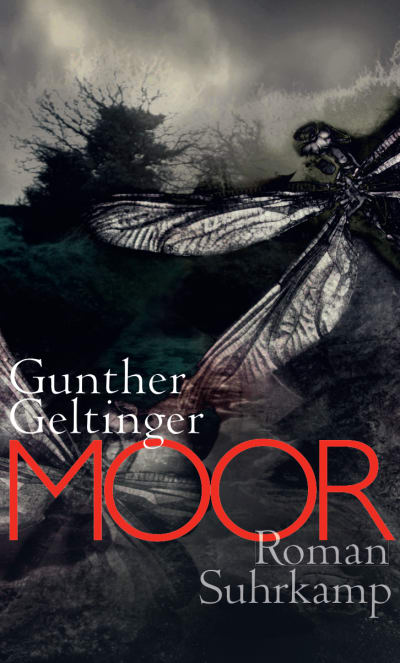A novel about what we do to escape loneliness: about all the demands we make of love, even as we hurt those around us in a misguided attempt to bear our own suffering. It is linguistically powerful, visually evocative, bold – and it boasts a narrative voice learned from forces of nature, a voice literally extracted from the ground beneath the reader’s feet.
He’s thirteen and growing...
»The stork delivers all little babes – all except Dion, whom the moor made.«
A novel about what we do to escape loneliness: about all the demands we make of love, even as we hurt those around us in a misguided attempt to bear our own suffering. It is linguistically powerful, visually evocative, bold – and it boasts a narrative voice learned from forces of nature, a voice literally extracted from the ground beneath the reader’s feet.
He’s thirteen and growing up without a father. He stutters, and has a name like no other child in the village or the school: Dion. Dion Katthusen, ostracized by his peers, only child, dragonfly collector in a moorland full of myths and legends. At the end of his childhood he tells his story, of a deep desire for faultless speech and of his relationship to his mother, an unsuccessful painter who has compensated for her failure in art and life with her boundary-less relationship with her son. But like the swampy earth surrounding the north German village where he’s grown up, Dion’s speech is full of fissures and holes. Incapacitated, he’s not able to bring narrative order to the chaos in him and around him, and so he lends his voice to a counterpart, which seems to him to be everything else: his childhood landscape. The moor speaks for him.
»The letter K has always been a great enemy, four zags with a sharp sound, and in its wake stands the D, which comes in so fat and round and still sticks in your throat: Dion Katthusen, a massacre.«
»Combining the forceful quality of the second-person narrative with a restless experimentation with language, German writer Gunther Geltinger mesmerizes with Moor. This aching story of a speech-challenged boy and his desire to connect with those who should love him unconditionally will haunt the reader long after the final sumptuous description of the book’s eerie physical and emotional terrain has faded.« World Literature Today
»Geltinger’s second novel traces a lavishly descriptive path through the titular landscape – finely rendered in Booth’s translation. [...] Lush imagery abounds, with gorgeous depictions of the northern German countryside.« Publishers Weekly
»With an ear perfectly tuned to registering emotional shade and recognizing the involuntary episodes of self-deception within our emotional and psychological landscapes, Geltinger manages to tell a tale that would not have itself be told. That is something that only great literature can do.« DIE ZEIT
»The fury of images and metaphors, the frenetic chains of associations, the intoxication into which the reader unexpectedly falls – here we are dealing with one who has cast off everything that once inhibited him. One who no longer recognizes any boundaries at all. And that is rather incredible.« Frankfurter Rundschau
»Geltinger risks everything and wins.« KulturSpiegel
»A novel that has the power of a Greek tragedy.« Stuttgarter Nachrichten
»For the novel Moor is also a song of praise to nature, to the body. Within the sensitive, poetic descriptions of dragonflies and owls, of weather and light, of the secrets of our ever metamorphosing body, there is a delicate beauty.« Deutschlandfunk
»With great feeling, Gunther Geltinger describes the difficult, all but irresolvable conflict that dominates the separation of Marga from her son Dion and blocks both of them from gaining autonomy. […] This powerful, radical book is a triumph.« 3sat Kulturzeit
»Combining the forceful quality of the second-person narrative with a restless experimentation with language, German writer Gunther Geltinger mesmerizes with Moor. This aching story of a speech-challenged boy and his desire to connect with those who should love him unconditionally will haunt the reader long after the final sumptuous description of the book’s eerie physical and emotional terrain has faded.« World Literature...
Persons
Gunther Geltinger
Gunther Geltinger was born in Erlenbach in 1974 and currently lives in Cologne. He studied scriptwriting and drama at the University of Music and Performing Arts in Vienna and at the Academy of Media Arts in Cologne. His critically acclaimed debut Mensch Engel was published in 2008, followed by his second novel Moor in 2013; Benzin is his third novel.
Gunther Geltinger was born in Erlenbach in 1974 and currently lives in Cologne. He studied scriptwriting and drama at the University of Music and...
OTHER PUBLICATIONS

Fuel
This isn’t the first time Alexander and Vinz have taken a trip together because their relationship has reached a crisis point. The road trip through South Africa is meant to give them clarity, and Vinz, the writer, hopes to get a new idea for a novel. Careening past street markets, Chicken Inns and hitchhikers, the two Germans make their way through a country where wealth and poverty collide,...
